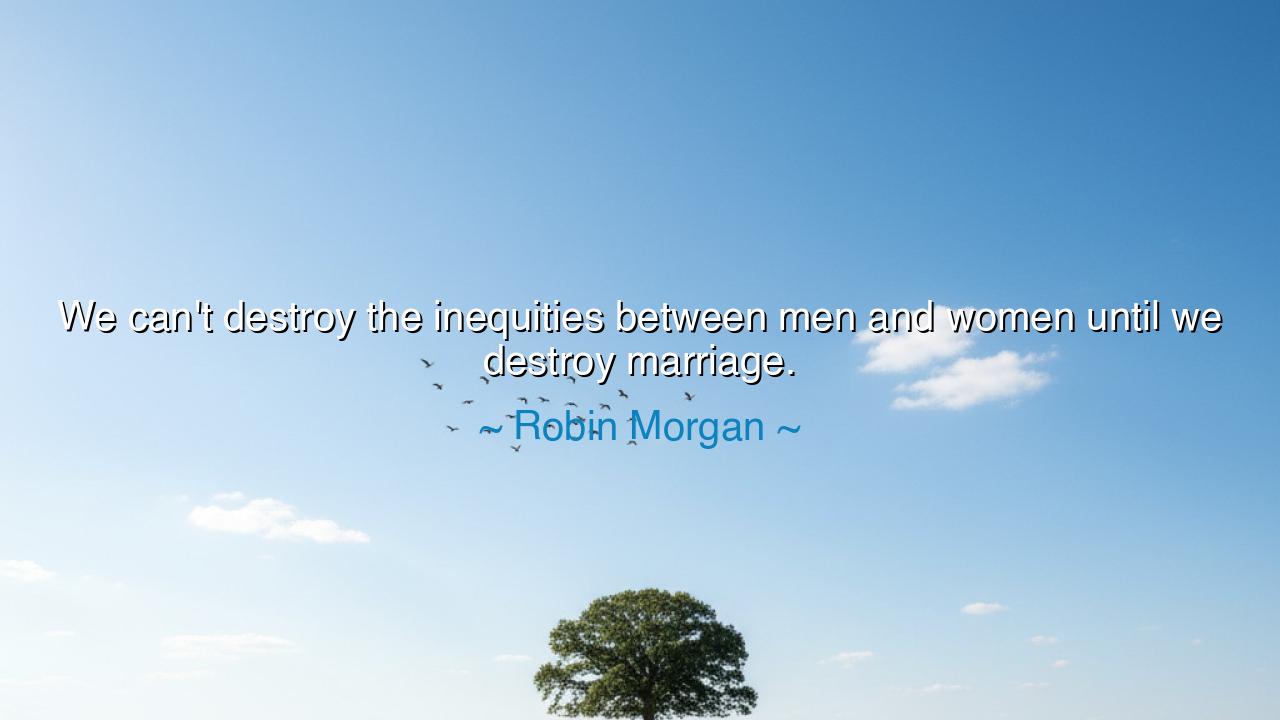
We can't destroy the inequities between men and women until we






The words of Robin Morgan — “We can’t destroy the inequities between men and women until we destroy marriage.” — strike with the force of a storm, fierce and uncompromising. They are not the words of one who despises love, but of one who dares to question the ancient structure that has too long disguised domination as devotion. Morgan, a poet, a feminist, and a revolutionary thinker, speaks from the heart of a struggle centuries deep — the struggle to free womanhood from the invisible chains woven into custom, religion, and law. Her call to “destroy marriage” is not a call to end love or partnership, but to dismantle the system that for ages has placed one soul above another beneath the sacred veil of union.
In the time of Robin Morgan, the twentieth century was awakening. The second wave of feminism had risen, not from luxury, but from necessity. Women had entered the workforce, had spoken from pulpits and platforms, and yet still found themselves tethered to roles defined by men and maintained by tradition. Marriage, once seen as a covenant of love, had become, for many, a structure of inequality — where men were masters of property, decision, and destiny, and women the keepers of service and silence. Morgan’s words arose from this awareness: that the very institution of marriage, as it had been constructed by patriarchal society, was not merely imperfect, but corrupted at its root.
To “destroy marriage,” in her vision, was to rebuild it anew — to tear down the scaffolding of ownership and rebuild the house of love upon the foundation of equality. For in ancient times, marriage was not born of romance, but of contract. In Rome, it was a transaction; in the feudal age, it was an alliance. Women were exchanged like dowries, their worth tied to lineage or fertility. Even in modern times, the echoes of that history remain: the father “giving away” the bride, the wife taking her husband’s name, the expectation of sacrifice flowing more heavily one way than the other. Morgan’s cry was the cry of generations who had lived under such holy inequality and dared to envision a love that did not depend on bondage.
Consider the tale of Mary Wollstonecraft, the fiery mind of the eighteenth century, whose Vindication of the Rights of Woman laid the groundwork for the feminist thought that would one day ignite Robin Morgan’s pen. Wollstonecraft, too, questioned marriage, calling it a “legal prostitution” when it reduced women to dependence. She lived bravely, loving passionately yet freely, seeking to live as an equal rather than an ornament. Her defiance scandalized her world, but her courage birthed a new one. Through her, we see the truth of Morgan’s message: that true equality demands not the preservation of unjust systems, but their transformation — or, when necessary, their destruction.
Robin Morgan’s words are not easy to hear, for they ask us to look unflinchingly at what we hold sacred. They remind us that love itself cannot sanctify oppression. What she speaks of is not the end of union, but the death of hierarchy. She calls for a reimagining — that men and women should meet not as ruler and ruled, provider and dependent, but as two whole beings walking the same path, neither owned nor diminished by the other. Until marriage — as an institution — reflects that equality, she argues, it remains a shadow of what it could be. Her cry is not against partnership, but against possession.
And yet, there is tenderness in her fire. For Morgan does not despise love — she seeks to liberate it. She understands that love bound by power is not love, but submission. To destroy marriage in her sense is to free love from the law, to let it live as a choice renewed each day, not as a contract enforced by custom or coercion. She envisions a world where union is sacred not because it is sanctioned, but because it is freely chosen — where loyalty is born not from fear, but from respect, and commitment is proof not of control, but of courage.
From her words, let us take not bitterness, but bravery. Let us ask ourselves what must be destroyed in our own hearts — pride, entitlement, complacency — so that love may thrive in equality. Let every marriage, every partnership, every bond of human affection be tested against this question: Does it honor both souls as equal? If it does not, then it is not worthy of endurance. And let those who dream of true companionship remember that equality is not born of comfort, but of conscious effort, the daily practice of seeing one another not as halves to complete, but as equals to uplift.
So hear this teaching, as if spoken from the mountain of time: love must evolve, or it perishes. The old forms of marriage — born in the age of possession — must yield to new forms born in the age of partnership. Only when man and woman stand as equals, not merely in law but in life, will the ancient war between them cease. This, then, is the spirit of Robin Morgan’s cry: not the destruction of love, but its purification — the breaking of chains so that both may walk free, hand in hand, beneath the open sky of a just and equal world.






AAdministratorAdministrator
Welcome, honored guests. Please leave a comment, we will respond soon